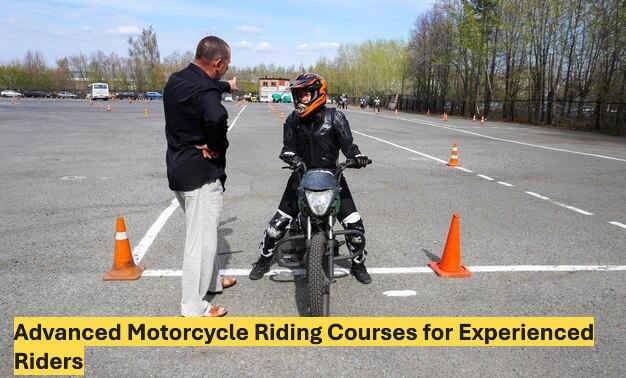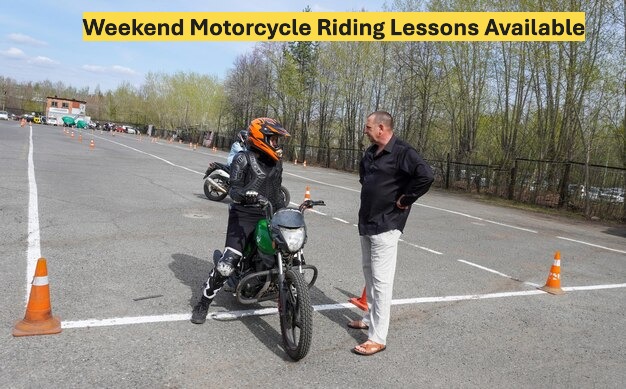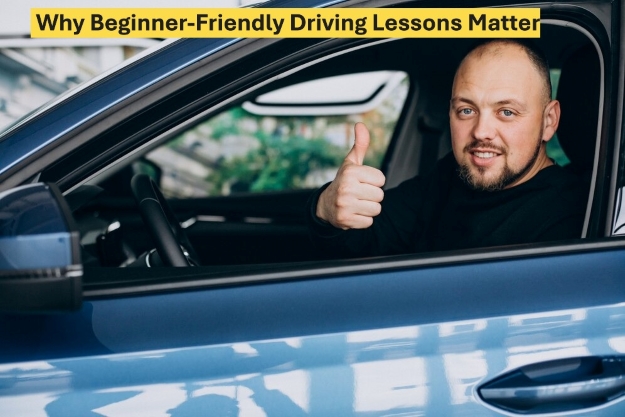Advanced Motorcycle Riding Courses for Experienced Riders

Motorcycling is a thrilling and liberating experience, but as an experienced rider, there’s always room for improvement. Whether you want to refine your skills, learn new techniques, or become more proficient in challenging riding conditions, advanced motorcycle riding courses are designed to take your abilities to the next level. In this article, we’ll explore the benefits of advanced motorcycle riding courses, what to expect, and how they can help experienced riders continue to grow and enhance their riding skills.
Why Experienced Riders Should Consider Advanced Motorcycle Riding Courses
As an experienced rider, you may feel confident in your skills, but advanced riding courses offer a unique opportunity to develop your abilities further. Even the most seasoned riders can benefit from revisiting the fundamentals and learning new strategies. These courses focus on refining techniques and offering more profound insights into handling complex riding situations.
Advanced training can help you overcome bad habits that may have developed over time, making you a safer and more competent rider. It also prepares you for riding in challenging conditions such as bad weather, high-speed maneuvers, and emergencies.
The Importance of Continuous Learning for Experienced Riders
Motorcycling is constantly evolving, and so are the safety techniques and technologies that come with it. Advanced motorcycle riding courses provide up-to-date training on safety innovations, riding strategies, and even bike modifications. Even experienced riders can benefit from revisiting crucial safety techniques and improving their reaction times, cornering abilities, and braking techniques.
By taking an advanced motorcycle safety course, riders can focus on the skills needed for more complex scenarios that beginner-level training might not address. These courses emphasize personal development in motorcycle handling, making you more confident and prepared in all riding situations.
What to Expect in an Advanced Motorcycle Riding Course
Advanced motorcycle courses go beyond basic handling and focus on complex techniques and safety measures experienced riders can apply in real-world situations. Each program is designed to suit different experience levels, primarily aiming to increase a rider’s skill set. Here’s what you can expect when enrolling in an advanced motorcycle riding course:
Classroom Instruction
Though the focus of advanced motorcycle training is mainly practical, some classroom instruction is still involved. Riders are educated on advanced riding strategies, defensive techniques, and situational awareness during these sessions. Additionally, there’s a focus on understanding the physics of riding, such as how the bike’s suspension, tires, and braking systems interact under different conditions.
On-the-Road Training
Advanced riders will spend significant time on the road during training. On-the-road lessons allow one to practice more complex skills in a controlled environment. These may include high-speed cornering, emergency braking, and navigating through traffic at various speeds. You’ll learn to react in tight situations, such as riding on narrow roads, avoiding obstacles, and handling a bike when skidding.

Advanced Handling Techniques
An essential part of any advanced motorcycle riding course is learning advanced handling techniques. This includes improving cornering skills, mastering quick and precise braking, and learning the art of throttle control during different riding conditions. For experienced riders, these techniques are crucial for reducing the risk of accidents and effectively handling their motorcycles under pressure.
Advanced motorcycle riding skills are an excellent low-competition keyword to target here. It’s relevant to what experienced riders are searching for, making it a solid choice for driving search traffic to the article.
Benefits of Advanced Motorcycle Riding Courses
1. Improved Safety
One of the most significant benefits of advanced riding courses is the focus on safety. These courses help riders learn how to handle a motorcycle in a way that reduces the risk of accidents. Advanced techniques for cornering, braking, and handling unexpected situations are key components of these courses.
2. Increased Confidence
Advanced courses give riders the skills and knowledge to handle their bikes confidently in high-pressure situations. Whether navigating tight turns, dealing with adverse weather conditions, or handling unexpected road hazards, you’ll feel more confident riding safely.
3. Enhanced Riding Enjoyment
Riders are more likely to enjoy their rides with improved skills and confidence. Advanced training teaches you how to fully enjoy your bike’s capabilities while ensuring you always remain safe. Mastering your bike’s performance allows you to push your limits in a controlled and secure manner.
4. Personal Growth as a Rider
Taking an advanced motorcycle riding course is not just about learning new techniques—it’s also about personal growth. Riders learn about themselves and their riding habits, which can lead to more mindful and responsible riding in the future. It helps you identify and break bad habits that have developed over time.
Choosing the Right Advanced Motorcycle Riding Course
When selecting an advanced motorcycle course, consider several factors to ensure it meets your needs and goals. Look for practical, hands-on training courses with experienced instructors who focus on real-world scenarios. The best programs will have small class sizes to ensure individual attention and guidance.
Additionally, the course must be recognized by relevant authorities, such as the Motorcycle Safety Foundation (MSF) or other accredited motorcycle training organizations. Make sure the program provides the right balance of theoretical lessons and practical application.
Motorcycle skills improvement courses are another great keyword to target. This term targets experienced riders looking for specific courses that focus on improving their skills, making it a valuable keyword for search optimization.
“FAQs”
1. What is the cost of advanced motorcycle riding courses?
The cost of advanced motorcycle riding courses varies depending on the course provider and location. On average, prices range from $200 to $500 for an entire course, typically including classroom instruction and practical riding sessions.
2. Do I need to own a motorcycle to participate in an advanced riding course?
Many advanced motorcycle courses provide motorcycles for their students. However, some programs may allow participants to bring their bikes. It’s essential to check with the course provider for their specific requirements.
3. How long does an advanced motorcycle riding course last?
Advanced motorcycle courses typically last 1 to 2 days, depending on the program. Some courses may be more intensive and span a weekend, offering a more comprehensive learning experience.
4. Will an advanced riding course improve my chances of passing a motorcycle skills test?
While an advanced riding course isn’t explicitly designed for passing a motorcycle skills test, the techniques learned can undoubtedly help improve your overall riding skills. This can indirectly enhance your performance during a skills test, especially if you want to refine your cornering, braking, and bike handling.
Conclusion
Advanced motorcycle riding courses are essential for experienced riders looking to enhance their skills, safety, and overall riding enjoyment. By focusing on advanced techniques such as cornering, braking, and emergency response, these courses provide invaluable lessons for riders who want to stay at the top of their game. Not only do these courses increase safety and confidence, but they also help riders improve their skills in real-world scenarios.
Whether you want to refine your skills, overcome bad habits, or enjoy your bike more, advanced motorcycle training is a worthwhile investment for any serious rider. Continuing to learn and improve ensures you can handle any challenge the road throws, keeping you safe and enjoying the ride for years.
By targeting specific, low-competition keywords such as “advanced motorcycle safety course” and “motorcycle skills improvement courses,” this article is optimized for search engines, helping it rank well and attract more traffic from experienced riders looking to take their skills to the next level.




